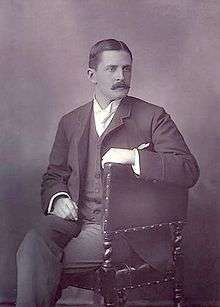Thomas Heazle Parke
| Dr. Thomas Heazle Parke | |
|---|---|
 Thomas Heazle Parke by Herbert Rose Barraud | |
| Born | 1857 |
| Died | 1893 |
| Allegiance | United Kingdom |
| Commands held | Stairs Expedition to Katanga; Emin Pasha Relief Expedition |
| Awards | Honorary Fellowship of the Royal College of Surgeons in Ireland[1] and was awarded gold medals from the British Medical Association and the Royal Geographical Society. |
| Other work | doctor, explorer, British Army officer and naturalist. |
Surgeon-General Thomas Heazle Parke (1857–1893) was an Irish doctor, explorer, soldier and naturalist.
Early life
Parke was born in 1857 at Clogher House[2] in Kilmore, County Roscommon, Ireland, and was brought up in Carrick-on-Shannon, County Leitrim. He graduated from the College of Surgeons in Dublin and was appointed to a post in Ballybay, County Monaghan.
In 1881 he joined the British Army and served in Egypt[1] as a surgeon. Parke fought to Khartoum in relief of General Gordon in 1885.
Emin Pasha Relief Expedition

. Parke campaigned with Henry Morton Stanley on the Emin Pasha Relief Expedition. This expedition lasted three years and many were saved from death by Parke's courage and medical skills. He was known as the "man who had saved Stanley".[3] He thus became the first Irishman to cross the African continent. During the expedition Parke bought a pygmy girl. They travelled together for over a year and she nursed him through malaria. In the end he was forced to leave her behind because her eyes could not adapt to sunlight after the darkness of the forest.

Later life
When Parke returned home he received an Honorary Fellowship of the Royal College of Surgeons in Ireland[1] and was awarded gold medals from the British Medical Association and the Royal Geographical Society. Among his published works are My Personal Experiences in Equatorial Africa (published in 1891) [3] and A Guide to Health in Africa. He died in Scotland in 1893 and his coffin was brought back to Ireland and drawn on a gun carriage from the Dublin docks to Broadstone station.[1] He was buried in Drumsna.[3]
Honours
A bronze statue of Parke stands on Merrion Street in Dublin, outside the Natural History Museum.

On the granite pedestal is a bronze plaque depicting the incident on 13 August 1887 when Parke sucked the poison from an arrow wound in the chest of Capt. William G. Stairs to save his life. He is also commemorated by a bust in the Royal College of Surgeons in Ireland.[1]
References
- 1 2 3 4 5 "Thomas Heazle Parke". Dictionary of Ulster Biography. Retrieved 2008-06-25.
- ↑ "Thomas Heazle Parke". Ricorso. Retrieved 2008-06-25.
- 1 2 3 "Dr Thomas Heazle Parke". Ulster American Folkpark. Retrieved 2008-06-25.
- Shee, J. Charles : Report from Darkest Africa (1887-1889)
- Lyons, J. B. Surgeon Major Parke's African journey 1887-89. The Lilliput Press, Dublin. 1994.
- Some of his papers are held at the Yale University Library
External links
-
 Media related to Thomas Heazle Parke at Wikimedia Commons
Media related to Thomas Heazle Parke at Wikimedia Commons